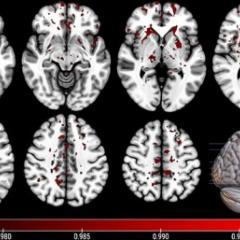 University of Queensland researchers have adapted an internationally used test which screens patients for dementia and Alzheimer's disease, to make it suitable for people with hearing loss.
University of Queensland researchers have adapted an internationally used test which screens patients for dementia and Alzheimer's disease, to make it suitable for people with hearing loss.
Professor Piers Dawes from UQ's School of Health and Rehabilitation Sciences said The Montreal Cognitive Assessment (MoCA) is the most widely used cognitive screening test in the world, yet it’s not suitable for people with hearing problems because it uses verbal questions.
“The MoCA has been in use for around 18 years and is largely used by health professionals as a tool to assess short term memory, executive functions, attention, language, and orientating time and place,” Professor Dawes said.
“However, as the test is administered verbally there is the possibility of people being misdiagnosed with conditions such as dementia, when in fact they may have hearing problems.
“Due to the design of the test, examiners are unable to repeat questions so people with hearing problems may end up with an over estimation of their cognitive impairment because they misheard or didn’t hear a question.
“Working with an international team we developed The MoCA-H, a version which utilises written stimuli instead of spoken word.
“Results showed the MoCA-H is a sensitive and reliable means of identifying dementia among adults with a hearing impairment.”
The adapted version was tested on 159 people with hearing impairment, including 76 people with normal cognition and 83 people with dementia.
The research team then looked at how people had performed on various test questions and put together a combination of questions that best discriminated between people with normal cognition and those with dementia.
Professor Piers Dawes said the MoCA-H is currently being translated into other languages and will be used around the world.
“There have been previous attempts to make the test suitable for people with hearing problems, but this is the first time it’s been rigorously developed and evaluated,” Professor Dawes said.
“More than 75 per cent of people aged over 75 have a hearing impairment, which is why it’s so important to have this alternate means of testing.
“The MoCA-H ensures they have an opportunity to be accurately screened for cognitive impairments like dementia and Alzheimer's, so they can take appropriate measures to manage their quality of life.”
The research is published in the Journal of the American Geriatrics Society.



